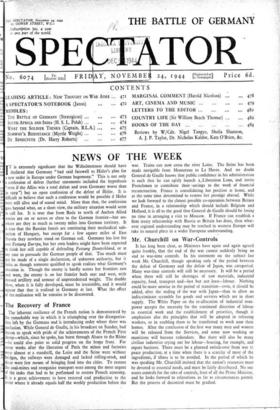Mr. Churchill on War-Controls
It has long been clear, as Ministers have again and again agreed quite frankly, that the end of the war cannot suddenly bring an end to war-time controls. In his statement on the subject last week Mr. Churchill, though speaking only of the period between the defeat of Germany and the defeat of Japan, was categorical. Many war-time controls will still be necessary. It will be a period when there will still be shortages of raw materials, industrial capacity, food, transport and—last but not least—labour. Nothing could be more unwise in the period of transition—even, it should be added, after the ending of the war with Japan—than to allow an indiscriminate scramble for goods and services which are in short supply. The White Paper on the re-allocation of industrial man- power accepts the necessity for the continued direction of !about to essential work and the establishment of priorities, though it emphasises also the principles that will be adopted in releasing workers, or in enabling them to be transferred to work near theit homes. After the conclusion of the first war many men and women will be released from the Services, and some now working on munitions will become redundant. But there will also be many civilian industries crying out for labour—housing, for example, and export business. There must be a planned switch-over from war to peace production, at a time when there is a scarcity of most of the ingredients, if chaos is to be avoided. In the period of which he
was speaking Mr. Churchill insisted that the nation's resources must be devoted to essential needs, and must be fairly distributed. No one wants controls for the sake of controls, least of all the Prime Minister, and he looks forward to relaxations as far as circumstances permit. But the process of decontrol must be gradual.


























